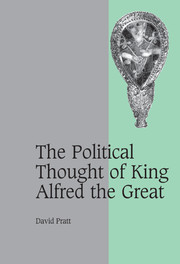Book contents
- Frontmatter
- Contents
- Acknowledgements
- List of abbreviations
- Note on citations
- Chapter 1 INTRODUCTION
- Part I The West Saxon Political Order
- Part II Alfredian Discourse and its Efficacy
- Chapter 7 THE FIELD OF ALFREDIAN KNOWLEDGE
- Chapter 8 THE CONSTRUCTION OF ALFREDIAN DISCOURSE
- Chapter 9 ALFREDIAN TECHNOLOGY: BOOKS AND ÆDIFICIA
- Chapter 10 THE HIERDEBOC AS A TREATISE OF POWER
- Chapter 11 THE DOMBOC AS A REORIENTATION OF ROYAL LAW
- Chapter 12 TRIBULATION AND TRIUMPH IN THE FIRST FIFTY PSALMS
- Chapter 13 THE SEARCH FOR A SATISFACTORY CONSOLATION
- Chapter 14 SEEING GOD AS HE IS
- Chapter 15 CONCLUSION
- Appendix: West Frankish deployment of Solomon's dream
- Bibliography
- Index of manuscripts
- General index
- Cambridge Studies in Medieval Life and Thought Fourth Series
Chapter 13 - THE SEARCH FOR A SATISFACTORY CONSOLATION
Published online by Cambridge University Press: 06 July 2009
- Frontmatter
- Contents
- Acknowledgements
- List of abbreviations
- Note on citations
- Chapter 1 INTRODUCTION
- Part I The West Saxon Political Order
- Part II Alfredian Discourse and its Efficacy
- Chapter 7 THE FIELD OF ALFREDIAN KNOWLEDGE
- Chapter 8 THE CONSTRUCTION OF ALFREDIAN DISCOURSE
- Chapter 9 ALFREDIAN TECHNOLOGY: BOOKS AND ÆDIFICIA
- Chapter 10 THE HIERDEBOC AS A TREATISE OF POWER
- Chapter 11 THE DOMBOC AS A REORIENTATION OF ROYAL LAW
- Chapter 12 TRIBULATION AND TRIUMPH IN THE FIRST FIFTY PSALMS
- Chapter 13 THE SEARCH FOR A SATISFACTORY CONSOLATION
- Chapter 14 SEEING GOD AS HE IS
- Chapter 15 CONCLUSION
- Appendix: West Frankish deployment of Solomon's dream
- Bibliography
- Index of manuscripts
- General index
- Cambridge Studies in Medieval Life and Thought Fourth Series
Summary
The version of Boethius’ Consolatio philosophiae captures the height of royal ambitions. A revered monument of Late Antique theology and philosophy, the Latin text offered extensive enquiry into fundamental problems of human existence, supremely enacted in didactic dialogue. Individual suffering, the operation of fate and providence, the nature of good and evil: all found treatment, and answers, amid Boethius’ own desperate predicament, imprisoned and awaiting death under his former master, Theoderic, Ostrogothic ruler of Italy (490–526). Surpassing all but the Soliloquies in translatory freedom, royal treatment of Boethius has aroused much enquiry, complicated by a possible role for Latin commentary material; while at macro-level, critics have placed varying constructions on argumentative departure. On any interpretation, royal methods cannot be detached from the esoteric qualities of Boethian source-text, distant from Gregory's humble biblicism. Philosophy remained inherently remote from man, tenuously disclosed through stages of enlightenment. The act of translation required extensive engagement with Boethian philosophy; many features imply special interest in pertinent questions, not always closely related to original Latin argument.
In many cases departures cannot be explained by a textual source; they acquire logic and coherence rather as expressions of Alfredian discourse, amid active theorizing on the responsibilities of power. An austere invitation to philosophy, Boethian Neo-Platonism offered much potential as royal wisdom, yet the extremity of its consolation matched Boethius’ own circumstances, in full flight from the world.
- Type
- Chapter
- Information
- The Political Thought of King Alfred the Great , pp. 264 - 307Publisher: Cambridge University PressPrint publication year: 2007



